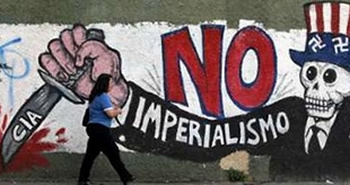Untitled Document
 |
|
Thousands of international activists have gathered in Caracas for the sixth World Social Forum, to protest against war, U.S. economic policies and debate on topics from fair trade to indigenous rights. REUTERS/Christian Veron
|
An informal International Women's Tribunal, meeting at the sixth World
Social Forum in the Venezuelan capital, found "imperialism" and U.S.
President George W. Bush guilty of violating the human rights of people in countries
like Iraq and Cuba. Another panel made up of 10 religious leaders, human rights
lawyers and activists held a trial and condemned "state terrorism"
committed by Washington in Iraq.
Meanwhile, the Parliamentary Forum, which brought together the legislators
taking part in the annual WSF global civil society gathering, roundly criticised
a U.S. bill that would tighten immigration laws.
Host President Hugo Chávez, addressing some 15,000 WSF participants,
called the Bush administration "the most perverse, murderous, genocidal
and immoral empire" in history.
The Venezuelan leader said Bush, who he calls "Mr. Danger", in reference
to a character in a Venezuelan novel, is "the world's biggest terrorist".
"Mr. Danger talks about human rights, but there are people in Guantanamo
(Cuba) who are tortured, and people who disappear in the CIA jails in Europe
and elsewhere in the world," Chávez told a cheering crowd.
In every street demonstration held at the Jan. 24-29 WSF in Caracas, signs
can be seen proclaiming "No to Bush!" or "Get Out Bush!",
while the protesters frequently chant anti-Bush slogans.
The International Women's Tribunal heard testimony from Irma González,
the daughter of one of the "Cuban Five" - the five Cuban men in prison
in the United States on espionage charges - and from Ramia Masi, an activist
with the Organisation of Women's Freedom in Iraq.
González said her father had spent seven years in prison without being
able to receive visits, "because among other things, it has gotten more
and more complicated to obtain a visa to the United States, which is a routine
human rights violation."
For her part, the Iraqi activist presented a documentary that contains personal
accounts and testimony on atrocities committed in the U.S.-led war and occupation
of Iraq.
"Fundamentalism is a new thing in Iraq," said Masi. "The occupation
drew out the greatest enemy of my country, the fundamentalists, who have destroyed
our identity." She called for the construction of a secular alternative,
in which women can be free.
Among those sitting on the panel that tried and condemned state terrorism were
Reverend Lucius Walker, the leader of the U.S. organisation Pastors for Peace,
Mexican activists Héctor Díaz and Guillermo López, and
Reverend Raúl Suárez, a peace activist from Cuba.
The witnesses testifying against the Bush administration included Fernando
Suárez, a Mexican-American whose son was killed in Iraq; Javier Couso
from Spain, whose brother José, a journalist, was killed when a U.S.
tank fired a shell at the Palestine Hotel in Baghdad, which was being used as
a base by many independent reporters; and Colombian parliamentary candidate
Lilia Solano.
Couso recalled that 90 journalists have lost their lives during the war in
Iraq, while Suárez stressed that his son died as a victim of a cluster
bomb, which "the United States is using on a daily basis in Iraq and which
not only claim the lives of Iraqi civilians, but also the lives of their own
soldiers. Bush is the number one terrorist," he declared.
Solano spoke out about Plan Colombia and its recently launched second stage,
Plan Patriot - counterinsurgent and anti-drug initiatives that she described
as "state terrorism financed by Washington."
The panel concluded by "firmly condemning" imperialism and the Bush
administration.
In the meantime, a delegation of lawmakers from Mexico earned the backing of
legislators from throughout the region in their opposition to a bill currently
before the U.S. Congress aimed at extending the fences already blocking portions
of the U.S.-Mexican border, among other measures.
Rafael Quintanar, a legislator from the centre-left Democratic Revolutionary
Party (PRD) in the Mexican state of Quintano Roo, told IPS: "We want to
condemn the wall of death that the United States is erecting on the border,
and the new immigration law," which could come to a vote next month, and
would penalise both undocumented immigrants and their eventual employers.
Another PRD representative, Emiliano Ramos, said that the party is collecting
declarations of support and solidarity for Mexico from two dozen Latin American
lawmakers, which it plans to send to the International Court of Justice in The
Hague.
Another initiative being discussed at the WSF, Ramos added, is the organisation
of a march from Central America to a point on the Mexican border with the United
States, where a forum on migration is to be held in March.
The fence that the United States wants to throw up along the border "is
the wall of indignity, death, racism, impunity and legalised crime," he
maintained.
In his speech, Chávez called on WSF participants to condemn the U.S.
government, "but not the people of the United States, whose participation
is essential to save the planet."
As for "U.S. imperialism," he pronounced that "we will surely
bury it this century."

